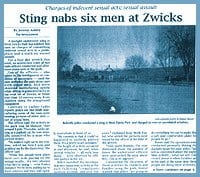Ross Lees isn’t concerned about the public embarrassment that results from publishing the name of someone accused, but not convicted, of a sexual crime.
“The person has to think about that long before they commit a sex act in a park. My job is to report what took place,” says Lees.
Lees is the news editor of The Picton Gazette, one of the many newspapers which ran the story this spring about nine men charged at various times with indecent sexual acts in a public place. There was one charge of sexual assault against a police officer when a man allegedly grabbed the officer’s crotch. The arrests were the result of a police sting operation in Belleville’s Zwicks Park.
Although the police report on the arrests named all the men charged, their addresses, hometowns and ages, not all the newspapers chose to publish them. This discrepancy reflects the controversy surrounding the releasing of names of those charged with, but not convicted of, victimless crimes. Indecency is considered by the courts to be a minor crime which seldom merits jail time.
It’s the charge most often laid against men who have consensual sex in their cars or in bushes in parks. Even when the men are found not guilty or the charges are withdrawn, the publicity can cause enough humiliation to lead to some men to suicide.
Toronto lawyer John B Laskin says a newspaper’s decision to release the name of an accused is solely an ethical, not a legal, issue.
“Where someone hasn’t been convicted, there is the risk of blackening someone’s name when they haven’t, and maybe won’t, be convicted,” says Laskin.
Lees understands that publishing the name of an accused can hurt his reputation, but he says his paper always follows through.
“I don’t care what the crime is, it will affect their future regardless. If they are cleared there will be a story about that as well,” he says.
Bill Hunt is a Sunday editor of The Intelligencer, the Belleville newspaper that chose to run the sex sting story on its front page and publish all the names and the ages of the accused. He says it’s standard procedure to print the names of people accused of crimes.
“How [the release of personal information] affects the individual is based upon their lifestyle,” says Hunt.
Hunt says that if a gay man is out, the announcement that he is charged with performing sexual acts with another man will not be as detrimental to his reputation as if he were married with children, as some of the Belleville area men were.
“This was an incident that occurred in a highly public place – we named those charged as we would in a similar incident, especially because it is a public park, with a children’s playground,” says Nick Palmer, managing editor of The Intelligencer.
The Intelligencer’s sister paper, The County Weekly in Prince Edward County, didn’t run the names of the accused.
“We don’t run any charges for anything, only convictions, because we don’t have enough reporters to sit in court all day,” says County Weekly news editor Sue Capon. Only after one of the men pled guilty did his name appear in The County Weekly.
Capon says it’s not an issue the paper deals with frequently.
“We ran the stories because we’re talking about nasty things around children in playgrounds,” she says.
Lees says it was important to make a distinction between one of the accused, who later pled guilty, and another citizen of Picton who had the same name. So he published the age and address of the convicted man. The accused, who is married with three children, was given a conditional sentence (no jail time), including a year of probation with counselling.
Lawyer John Laskin agrees that the press is free to report whatever goes on in court, but it has to be responsible about it.
“The press must assess the value of releasing [personal information]. There are no legal guidelines,” he says.
But without any guidelines, won’t the journalist’s own biases – which sometimes includes homophobia – influence the story?
Staff Sgt Al Portt of the Belleville Police Force says the men weren’t treated any differently by the police or by the press because they were with other men. He says that treatment of any sort of sexual activity is always the same. He gives the example of a heterosexual couple cuddling who were spotted by Belleville police but weren’t charged.
“They weren’t naked, and they weren’t doing anything. They could have been charged. It depends on what they’re doing,” he says. “Anybody can be charged.”
Lees says the sex sting hasn’t fostered any homophobic feelings among the citizens of Belleville and the surrounding counties. He says the story didn’t get bigger play because the men were having sex with other men. It would have been reported the same “if it had been heterosexual couples performing sex acts in a public park, with kids, in the middle of the day.”
Capon disagrees. She says that if a heterosexual couple had been in the same situation, they may have been treated differently.
“I hate to say Belleville people are kind of homophobic, but they are. In the county, people don’t care. We were just worried about the playground and the children.”
But no one can agree whether there were indeed children in the park when the arrests were made. The latest information from police suggests there were not.

 Why you can trust Xtra
Why you can trust Xtra


